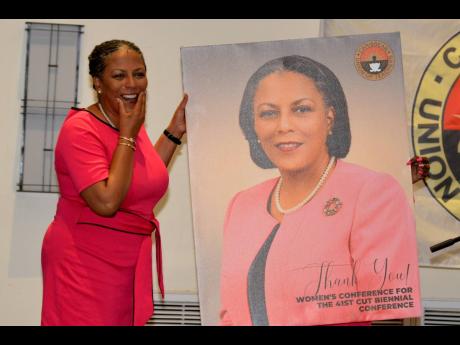Molloy pushes for Ja’s education sector to move full STEAM ahead
As delegates from various Caribbean territories met on Monday morning for the Caribbean Union of Teachers (CUT) Women’s Biennial Conference, at least one Jamaican educator, Nadine Molloy, principal of Ardenne High School, made it known that the arts need to be more widely accepted, especially for girls and women in the region to be more progressive.
Amid decades of women’s movements and females outnumbering males at the tertiary level, and with the University College of the Caribbean (UCC) having announced 88 per cent of its 2022-2023 graduates on Sunday being women, Molloy had to touch on the issue and incorporated Science, Technology, Engineering, Arts and Mathematics (STEAM) in the mix.
She strongly believes that the highly promoted acronym, STEM, needs to now fully include the arts in all Caribbean territories and be transformed to be promoted as STEAM with public education.
“It cannot be in the Caribbean, where we are such a creative people, we are so imaginative, we are so innovative, the steal pan we gave to the world, reggae music, own Jamaican language, and everybody here can tell us the different things that we do in the other islands, we can’t leave the A out of it. We can’t leave the arts,” Molloy said to the audience at The Jamaica Pegasus hotel in New Kingston, which mainly included educators who have been appointed to lead the various teachers’ associations across the Caribbean region.
“Again, this is mainly another area where a gap exists, and with the teacher migration, we are now operating in a critical time where we have a brain drain. We have to look again at how we train our women to be a part of the STEAM education initiatives,” she said.
Molloy, who is a former president of the Jamaica Teachers’ Association and executive board member at Educational International, also stated that while she was at the recently held Mico STEM Century International Conference in Jamaica, she raised her concern about the term STEM being used instead of STEAM, and was bluffed with reason.
“When I was at the MICO Conference last week, and I said, ‘Why are you saying STEM and not STEAM?’ I was told that in order to get the funding, we have to say STEM because they catch that easier. Okay, bring the funding but I will add ‘A’,” Molloy said.
“Again, this is maybe another area where a gap exists, and with the teacher migration and we are now operating in a critical time where we have a brain drain, we have to look again at how we train our women to be a part of the STEAM education initiative,” she said.
With years of public education by the Ministry of Education and Youth for STEAM, Jamaica has made remarkable progress. In 2010, the number of students enrolled in STEM programmes across Jamaica stood at a modest 5,000. However, as of 2023, that number has skyrocketed to an impressive 50,000, representing a tenfold increase in just over a decade.
In the past five years, the enrolment in STEM-related tertiary education programmes has increased by an impressive 40 per cent.
UNWAVERING COMMITMENT
This significant growth can be attributed to the unwavering commitment of the Government to prioritise STEM education. The Government has invested heavily in the expansion of STEM infrastructure in secondary schools, recruited and trained qualified STEM teachers, and developed an innovative curriculum that fosters critical thinking, problem-solving, and creativity.
Moreover, partnerships between academia, industry, and community organisations have also played a pivotal role in promoting STEM education. These collaborations have created invaluable opportunities for local students to engage in hands-on experiences, mentorship programmes, and research projects, which enhance their skills and inspire them to pursue careers in STEM fields.
Two weeks ago, Dr Nigel Clarke, minister of finance and the public service, announced that his ministry, through the Students’ Loan Bureau (SLB), would be providing 2,250 scholarships to boost the country’s capacity in STEM over the next five years.
Furthermore, the Jamaican job market has experienced a substantial shift as well, where the demand for skilled STEM professionals has soared, with an 80 per cent increase in the number of STEM-related job postings in the past decade.
That rise has not only resulted in reduced unemployment rates, but has also positioned Jamaica as a hub for innovation and technological advancement in the Caribbean region.
CUT member states present at the conference are from Anguilla, Antigua and Barbuda, Bahamas, Barbados, Belize, Bermuda, British Virgin Islands, Dominica, Grenada, Guadeloupe, Guyana, Haiti, Montserrat, St Croix, St Kitts and Nevis, St Lucia, St Vincent and the Grenadines, St Marteen, Suriname and Trinidad and Tobago.
The CUT Women’s Biennial Conference was held prior to the start of the official opening ceremony which was held last night, also at The Jamaica Pegasus hotel, under the theme ‘Caribbean Women, Prepared for Leadership: Empowered for Change’.
The 41st annual conference is being held under the theme ‘Getting it Right: Revolutionising Education, Prioritising Teachers’.


